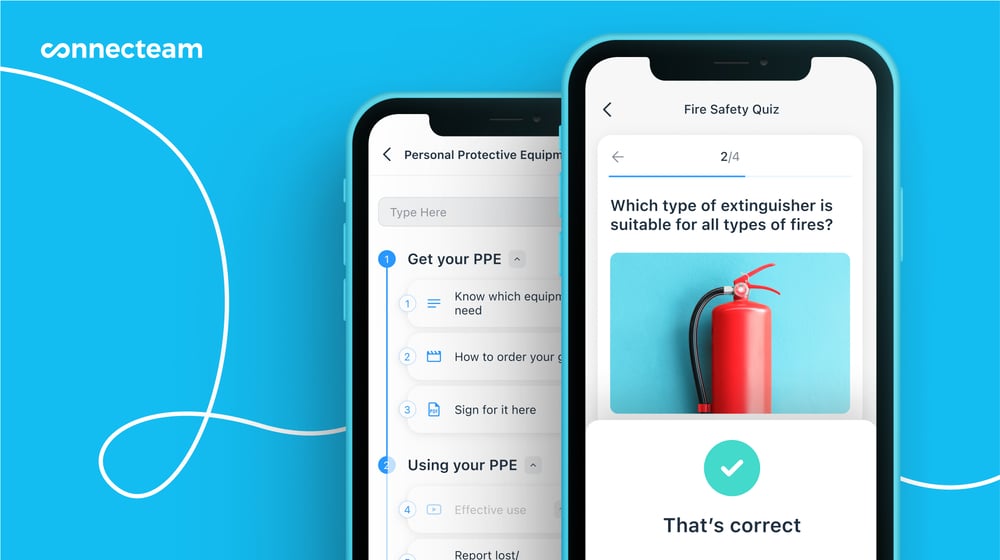Franchise training ensures that franchisees in your business understand the values and practices that define your brand. Building a successful franchise training program leads to success for franchisees and your business overall.
When you walk into a McDonald’s or another large franchise, you know what to expect.
Sure, there may be some slight differences between locations, but overall your experience in one will be similar to your experience in another.
This predictability is the biggest draw of franchises.
While part of the franchise experience is the branding — such as the name, logo, and design — much of it hinges on proper franchise training.
Building a successful franchise training program allows franchisees to duplicate the success of the original business and maintain brand consistency across all locations.
What Is Franchise Training?
Franchise training includes the education, support, and guidance you provide to franchisees in order to ensure their success in running the franchise.
The purpose of franchise training is to help franchisees understand the core values, operations, business processes, and effective marketing strategies of the franchisor.
If your business is offering franchise agreements, effectively training franchisees is vital to the success of your program.
It’s not enough for franchised businesses to look alike; they need to closely follow your business model to achieve similar success.

Benefits of Franchise Training Programs
Franchise training programs offer several benefits to both franchisees and franchisors.
These training programs are designed to provide the knowledge, skills, and support needed for running a successful franchise business by providing the following benefits.
Standardization
Your training program will teach the established processes, procedures, and standards that have made your brand successful.
This ensures that all franchise locations operate in a consistent manner, providing customers with a predictable and reliable experience. Ultimately, consistency is what builds your brand’s reputation and customer loyalty.
Skill Development
Comprehensive training programs focus on developing the wide range of skills necessary for running a successful franchise.
Business management, financial planning and analysis, marketing strategies, sales techniques, customer service best practices, and product or service-specific knowledge are just some of the skills your franchisees will need.
Support and Guidance
Franchise training programs often include ongoing support from the franchisor, such as mentorship, coaching, or access to dedicated support teams.
Your franchisees will face challenges in their businesses and will need regular support and advice from your team to overcome them.
Reduced Learning Curve
Comprehensive training programs help new franchisees hit the ground running by providing them with the necessary knowledge and resources to operate their business.
This accelerates the learning process, minimizes costly mistakes, and allows franchisees to focus on growing their business instead of struggling to learn the basics.
Although you probably provide all of the information they need in your operations manuals, many people need more guided training.
Compliance
Franchise training programs often include detailed information on the legal, financial, and operational requirements specific to the franchise system.
Compliance training helps franchisees correctly follow regulations, maintain brand standards, and minimize the risk of potential liabilities.

Networking Opportunities
Franchise training events, conferences, and seminars offer franchisees the opportunity to network with their peers from different locations. When they get together, they can share ideas, experiences, and best practices, which fosters a collaborative environment within your franchise system.
You may not think your franchise system is big enough to warrant these types of events, but even having smaller get-togethers around annual training can help create a sense of community.
Improved Performance
A well-trained franchisee is more likely to achieve better financial and operational results. Success benefits not only the individual franchisee but also your overall franchise system, as successful franchisees contribute to the growth and profitability of the entire network.
In addition to adding to your bottom line (if your fee is a percentage of earnings), profitable franchises will attract more franchisees.
Adapting to Changes
Ongoing training can help franchisees stay up-to-date with the latest industry trends, market changes, new products or services, and technological advancements. In today’s rapidly changing business landscape, adapting is essential to remain competitive and relevant in the marketplace.
Increased Franchisee Satisfaction
Effective training and support can lead to higher satisfaction and confidence among franchisees. Satisfied franchisees are more likely to remain committed to the brand, invest in its growth, and contribute to a stable and thriving franchise system.
Types of Training for Franchisees
Franchise training programs can vary depending on the specific needs of your business’s system and its participants. However, there are several types of training that most new franchisees will benefit from.
Initial Training
Initial training should be an essential part of the onboarding process. This training typically covers the major elements of the franchise, such as the business model, brand values, operational procedures, marketing strategies, financial management, and legal and regulatory requirements. Ideally, you’ll want to finish this training before the franchise’s grand opening so new franchisees are prepared for a strong beginning.
On-site Training
On-site training takes place at the franchise location or other local training facility and focuses on the practical aspects of operating the franchise. On-site training is ideal for new businesses since it will provide hands-on training on the actual equipment employees will be using.
You can include training on equipment use, inventory management, point-of-sale systems, customer service, and employee management. On-site training allows franchisees to gain firsthand experience and apply their learnings in a real-world setting.
🧠 Did You Know?
Studies show that people forget up to 70% of all information received during training in 24 hours, and all but 10% after a week. That means one-time training won’t do the job. With a digital and mobile training solution like Connecteam, you can create engaging and bite-sized training sessions that your franchisees can complete in their own time and repeat whenever they need a refresher.
Corporate Training
Corporate training sessions at your headquarters or a dedicated training center allow franchisees to learn directly from your leaders and subject matter experts.
These sessions may cover advanced topics such as strategic planning, marketing initiatives, or industry trends, so they’re more suitable for ongoing training for experienced franchisees.
Online Training
Online training platforms offer a flexible and convenient option for franchisees to access learning resources at their own pace.
Online training can be particularly useful for franchisees in remote locations or those with busy schedules. Franchisees can also use online training as a reference after they complete their training.
Ongoing Training
As you grow your franchise system, you’ll collect more data and build an increasingly effective program.
Ongoing training lets you share these insights with your franchisees. You can offer ongoing training in various formats to help your franchisees take their businesses to the next level.
Ongoing training also gives you a chance to touch base with your franchisees and evaluate your initial training program. You can use their feedback to improve your program.
Mentorship Programs
Mentorship programs offer a valuable support system for new franchisees, pairing them with experienced franchisees who can provide guidance, advice, and support. These mentor-mentee relationships can help new franchisees navigate the challenges of starting their business, learn from the experiences of others, and foster a sense of camaraderie within the franchise network.
Employee Training
Employee training is a crucial aspect of operating a successful franchise. You can offer resources and guidance for training employees at the local level, including hands-on training, training manuals, videos, or e-learning modules.
Effective employee training can lead to improved staff performance, higher customer satisfaction, and increased employee retention, contributing to the overall success of the franchise.
💡 Pro Tip
The right tools will make employee training much easier and Connecteam is an invaluable resource for efficient employee training. Easily deliver mobile training courses for your frontline teams to complete from anywhere, saving valuable time and money and ensuring compliance.
Customized Training
Customized training programs are tailored to the unique needs of individual franchisees or specific areas within the franchise system. You might want to offer customized training to address specific challenges, growth opportunities, or areas of improvement identified for a particular franchisee. This personalized training can be instrumental in helping franchisees overcome obstacles and maximize their potential for success.
Tips for Creating the Best Franchise Training Programs
Regardless of what type of training you’re offering, you can improve it by creating a positive learning environment and implementing some efficient teaching practices.
Set Clear Objectives
Setting clear objectives is a critical step in designing an effective training program. Well-defined objectives help ensure that your training program is focused, relevant, and designed to meet the specific needs of your franchisees. The following guidelines will help you set clear training objectives.
Start With the End Goal
Begin by identifying the desired outcomes of the training program. Consider the knowledge, skills, and abilities that your franchisees need to acquire to successfully operate their businesses. Keep the franchise’s overall goals, values, and mission in mind when defining these objectives.
Align Objectives With Franchisee Needs
Conduct a needs assessment to determine the specific training requirements of your franchisees. Use the findings to align your training objectives with the actual needs of the franchisees, ensuring the training program remains relevant and targeted.
Communicate Objectives Clearly
Everyone should understand exactly what they’ll gain from participating in your training program. Talk about the objectives at the beginning of your training program. This helps set expectations, provides direction, and establishes a clear understanding of what the training aims to achieve.
Provide Variety in Training Methods
You can cater to different learning styles, preferences, and needs of the franchisees by mixing up how you deliver your content. Use multiple training methods to enhance knowledge retention, increase engagement, and provide varied learning experiences. You may not be able to provide training through all of the channels listed below but try to offer several choices.
Instructor-led Training
Instructor-led training involves a trainer or subject matter expert delivering the content in person or via a virtual platform. It’s probably the learning environment you most closely associate with traditional school. It allows for real-time interaction, immediate feedback, and clarification. It also enables you to adapt the content based on participants’ needs and questions.
Hands-on Training
This method involves practical, experiential learning through simulations, role-playing, or on-the-job training. Hands-on training helps franchisees develop and practice new skills in a controlled environment, gain confidence, and understand how to apply their learnings in real-life situations. This is the ideal type of training to offer on-site to new franchisees.
E-learning Modules
E-learning involves self-paced online courses that can include multimedia content, interactive quizzes, and simulations. E-learning offers flexibility, allowing franchisees to access the training material at their convenience. You can also easily update and distribute it, ensuring that the content remains current and relevant. Modern learning platforms like Connecteam make it simple to deliver e-learning content.

Workshops
Workshops are interactive, small-group sessions where participants work on specific tasks, problems, or projects. Workshops encourage active participation, collaboration, and peer learning, allowing franchisees to learn from each other’s experiences and share best practices. Consider offering workshops as part of your ongoing training program.
Mentoring and Coaching
Mentorship programs create a close and long-term relationship between new and experienced franchisees. You can pair members of your internal leadership team with new franchisees or encourage your seasoned franchisees to participate.
Create a Positive Learning Environment
Everyone learns better in a positive environment. Students of all ages thrive when they’re relaxed, have the resources they need, and feel supported in their learning.
Build Rapport and Trust
Develop a rapport with franchisees by being approachable, supportive, and responsive to their needs. Encourage open communication and create a safe space for franchisees to express their opinions, ask questions, and share concerns without fear of judgment. Never ridicule a student for asking a question, even if it seems obvious to you.
Encourage Participation and Engagement
Design training sessions that encourage active participation, discussion, and collaboration among franchisees. Use interactive activities, group work, or brainstorming sessions to involve franchisees in the learning process and stimulate their interest in the material.
Respect Diversity and Individual Differences
Recognize and value the diverse backgrounds, experiences, and perspectives of your franchisees. Be sensitive to cultural differences, learning preferences, and individual needs, and make an effort to accommodate them in your training program.
Provide Constructive Feedback
Offer timely, specific, and actionable feedback to franchisees, focusing on their strengths and areas for improvement. Encourage a growth mindset by emphasizing the importance of learning from mistakes, perseverance, and continuous improvement.
Encourage Self-Reflection and Goal Setting
Encourage franchisees to reflect on their learning, set personal goals, and take ownership of their development. This helps foster a sense of autonomy and motivation, contributing to a more positive learning environment.
📚 This Might Interest You:
Dreaming of starting your own business without breaking the bank? Check out our guide to the best franchises under 10k and explore low-cost opportunities to turn your entrepreneurial vision into reality.
Next Steps in Franchise Training
Training sessions help your franchisees master all aspects of the daily operations of your business model. As the franchise owner, you’ll need to develop a comprehensive training strategy that will assist the franchisee in running their business as effectively as you have.
Ultimately, their success is your success, so it’s worth the investment. Whether you’re running your own business or helping others run theirs, Connecteam provides a complete solution for all of your business needs, from company-wide communication to HR and people management.
FAQs about Franchise Training Programs
1. What is the duration of a typical franchise training program?
The duration of a franchise training program can vary depending on the complexity of the business model and the industry. On average, training programs can range from a few days to several weeks, ensuring that franchisees receive comprehensive instruction on all essential aspects of running the franchise.
2. Is franchise training provided in-person or online?
Franchise training can be delivered through various methods, including in-person sessions, online modules, or a combination of both. In-person training offers hands-on experience and interaction with trainers, while online training provides flexibility and accessibility, especially for geographically dispersed franchisees. Use a mobile training solution like Connecteam to ensure your franchisees receive and understand all the information they need to run their business.
3. Are franchisees required to pay for the training program?
Franchisees typically pay an initial franchise fee, which may include the cost of the training program. However, it’s essential to review the franchise agreement and disclosure documents to understand the specifics regarding training program costs.
4. Can franchisees request additional training or refresher courses?
Yes, franchisees can usually request additional training or refresher courses. Franchisors recognize that ongoing learning is crucial for the success of their franchisees and often provide opportunities for further development.
5. How can franchisors evaluate the effectiveness of their training program?
Franchisors can evaluate the effectiveness of their training program through various methods, including feedback surveys, performance metrics, and franchisee success rates. Continuous evaluation allows franchisors to identify areas for improvement and refine their training programs accordingly.




